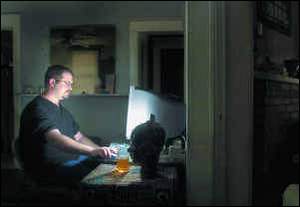I like Peter Beinart...
... But I dont like like him.
Over the past few weeks I've been impressed with the thinking of New Republic columnist Peter Beinart. (See here, and here. Thanks RealClearPolitics)
But his latest column gives me serious doubts as to his underlying suppositions.
In the words of Rummy himself, "You go to war with the army you have." Not a word here of how throughout the '90s, U.S. military might was slashed nearly in half (not to mention my own personal pet peeve, i.e. President Clinton ordering his own security detail of "Yankee-White" Marines to wear non-descript business suits instead of the traditional dress blues uniforms so as not to upset visiting dignitaries.) You cannot squeeze blood from a stone, Mr. Beinart, nor can you blame a single person for the fact that we just cannot produce an extra 100,000 troops at a moment's notice. "Leaner, meaner army?" How about listening to our military and comitting the resources they ask for? A pro-war liberal should, in my mind, be equally critical of Clinton's "lovey dovey" policies as he is of the first gulf war under Bush senior.
Are you under the delusion that the President lied during the presidential debates when he said that his ultimate goal was free elections in Iraq and empowering Iraqis to police themselves? Nation-building is what the Bush administration is attempting.
The looting I observed in places like Sader City (formerly Saddam City and I think that's a good thing) were not a result of Rumsfeld's "failure" to provide enough troops, rather they were the result of an oppressed people being liberated from an intolerable tyrant. To suggest that the U.S. military should wage war with a law enforcement mentality is simply ludacris.
"The U.S. inability to restore order?" More argument for the "hopeless quagmire" view of Iraq. I thought Peter was a pro-war liberal.
Look... I have my own gripes over the job Bremer did as interim Governor of Iraq. In my opinion he misused the Marine Corps as police officers because of the deterrent effect that marines have on the bad guys. (Army units eventually turned to painting "USMC" on the sides of their vehicles in order to avoid convoy attacks.) It's as if Bremer never heard accounts of marines attempting to police Beirut in 1983. (Law enforcement is not what we do, Paul.)
As for Bremer being an exacerbating factor, I happen to aggree.
No objection here. In my mind, Iraq was worth the effort, not only for humanitarian reasons, but also as a counter-measure to terrorism . There's a reason that I put these two justifications for war in that order. In hindsight I believe the humanitarian reasons for war in Iraq far outweigh the added bonus of making America safer. I carry in my wallet a picture of the Iraqi kids we released from a detention facility in Saddam City. I suspect that I will carry that picture for the rest of my life.
In the end, Peter cannot avoid piling on Donald Rumsfeld like the rest of the liberals . It's chiefly his fault, he says. He says Rumsfeld shouldn't be orchestrating our nation-building efforts in Iraq (or anywhere, really.) Why? Because he's not a liberal. "And, with liberals on the sidelines, the United States can't win."
I don't know if I will continue reading Peter's work. I was excited to find what I thought was a rational, thinking liberal. I'm disapointed to find that he was writing to appeal to conservatives like myself, and that he has to pen the above to explain himself to his fellow liberals.
Over the past few weeks I've been impressed with the thinking of New Republic columnist Peter Beinart. (See here, and here. Thanks RealClearPolitics)
But his latest column gives me serious doubts as to his underlying suppositions.
Lesson Plan
by Peter Beinart
...The second liberal hawk assumption was that the Bush administration would take postwar nation-building seriously...
The problem with this second assumption was that it underestimated Defense Secretary Donald Rumsfeld's mania to use Iraq as a showcase for his vision of a leaner, meaner military. Rumsfeld insisted on a much smaller U.S. force than the Army had proposed--a force capable of overthrowing Saddam, but incapable of providing security once he was gone. The meager U.S. invasion force being assembled in the Kuwaiti desert should have set off alarm bells among pro-war liberals, given the lessons from the '90s about how many troops were needed to prevent postwar chaos.
In the words of Rummy himself, "You go to war with the army you have." Not a word here of how throughout the '90s, U.S. military might was slashed nearly in half (not to mention my own personal pet peeve, i.e. President Clinton ordering his own security detail of "Yankee-White" Marines to wear non-descript business suits instead of the traditional dress blues uniforms so as not to upset visiting dignitaries.) You cannot squeeze blood from a stone, Mr. Beinart, nor can you blame a single person for the fact that we just cannot produce an extra 100,000 troops at a moment's notice. "Leaner, meaner army?" How about listening to our military and comitting the resources they ask for? A pro-war liberal should, in my mind, be equally critical of Clinton's "lovey dovey" policies as he is of the first gulf war under Bush senior.
[T]wo principles that undergirded it must be preserved if liberals are ever to lead the ideological struggle that will continue long after American troops leave Falluja.
The first is a belief in nation-building...
Are you under the delusion that the President lied during the presidential debates when he said that his ultimate goal was free elections in Iraq and empowering Iraqis to police themselves? Nation-building is what the Bush administration is attempting.
...Polls suggested that, in the immediate aftermath of Saddam's overthrow, Iraqis were far more grateful for the war--and far less hostile to the U.S. occupation--than they later became. The rapid souring was caused, above all, by Rumsfeld's refusal to provide enough troops to ensure security--a failure illustrated most dramatically in the spasm of looting that followed the U.S. victory.
The looting I observed in places like Sader City (formerly Saddam City and I think that's a good thing) were not a result of Rumsfeld's "failure" to provide enough troops, rather they were the result of an oppressed people being liberated from an intolerable tyrant. To suggest that the U.S. military should wage war with a law enforcement mentality is simply ludacris.
The U.S. inability to restore order was exacerbated by L. Paul Bremer's move to disband the Iraqi military, which also contradicted the advice of experts inside and outside the government. Disbanding the military stripped hundreds of thousands of Sunnis of their jobs and their pride, making them easy prey for the insurgency. That further undermined security and retarded reconstruction, thus preventing the tangible gains that might have preserved Iraqi goodwill toward the U.S. occupation.
"The U.S. inability to restore order?" More argument for the "hopeless quagmire" view of Iraq. I thought Peter was a pro-war liberal.
Look... I have my own gripes over the job Bremer did as interim Governor of Iraq. In my opinion he misused the Marine Corps as police officers because of the deterrent effect that marines have on the bad guys. (Army units eventually turned to painting "USMC" on the sides of their vehicles in order to avoid convoy attacks.) It's as if Bremer never heard accounts of marines attempting to police Beirut in 1983. (Law enforcement is not what we do, Paul.)
As for Bremer being an exacerbating factor, I happen to aggree.
[I]deologically, secular dictatorship promotes jihadist extremism--both because secular dictators fuel the popular rage that leads people to turn to Islamist opposition movements and because secular dictators seek legitimacy by ceding control over civil society to Islamists. That was true of Saddam, and it is true of many of his counterparts throughout the Middle East. Which is why ending tyranny in the Muslim world must be central to U.S. antiterrorist efforts.
No objection here. In my mind, Iraq was worth the effort, not only for humanitarian reasons, but also as a counter-measure to terrorism . There's a reason that I put these two justifications for war in that order. In hindsight I believe the humanitarian reasons for war in Iraq far outweigh the added bonus of making America safer. I carry in my wallet a picture of the Iraqi kids we released from a detention facility in Saddam City. I suspect that I will carry that picture for the rest of my life.
The danger is that, in the wake of Iraq, liberals will turn inward, as many did after Vietnam. They will abandon the belief that U.S. power can positively change the Muslim world and instead argue that the United States should merely aggravate it less while killing terrorists where we can. In a bitter irony, that will leave nation-building and democracy-promotion in the hands of conservatives like Rumsfeld, who never really believed in it. It will leave liberals on the sidelines of the great ideological struggle in which the United States is engaged. And, with liberals on the sidelines, the United States can't win.
In the end, Peter cannot avoid piling on Donald Rumsfeld like the rest of the liberals . It's chiefly his fault, he says. He says Rumsfeld shouldn't be orchestrating our nation-building efforts in Iraq (or anywhere, really.) Why? Because he's not a liberal. "And, with liberals on the sidelines, the United States can't win."
I don't know if I will continue reading Peter's work. I was excited to find what I thought was a rational, thinking liberal. I'm disapointed to find that he was writing to appeal to conservatives like myself, and that he has to pen the above to explain himself to his fellow liberals.

